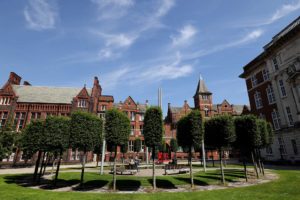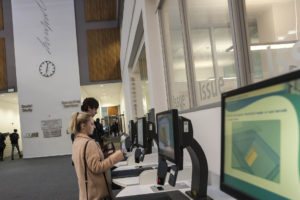Dental Therapy
UCAS code B750
- Study mode
- Full-time
- Duration
- 3 years
- Start date and application deadlines
-
- Start date
- September 2025 September 2026
- Apply by:
- Starts on:
UCAS code B750
We've set the country or region your qualifications are from as United Kingdom.
The University of Liverpool School of Dentistry offers a unique research-connected learning environment that is primarily focused on developing each individual, so that they can each realise their personal potential as well as qualify as a professional capable of providing compassionate, evidence-based, holistic dental care to patients.
Welcome to the School of Dentistry.
Students from different dental disciplines have the opportunity to work side-by-side and develop their skills in state-of-the-art simulation suites. Student growth is supported by our world-leading learning technology systems that provide personalised developmental progress information so that learning needs can be tailored by the individual. This personalised and supportive approach enables our students to have early access to patients, in their first year, so that developing skills can be authentically consolidated and integrated in the real-world situation. At Liverpool we take a blended approach to learning; this means that we use some online learning but with a predominance of in-person face to face teaching.
The School’s educational approach is driven by an ethos of continuous professional development because we strongly believe that our students need to learn how to continually adapt, so that they can appropriately respond to the current, as well as future, challenges in a dynamic world.
On successful completion of the programme you’ll be granted a Bachelor of Science in Dental Therapy degree that is registrable with the General Dental Council.
This innovative programme has been specifically designed to facilitate the development of real-world clinical, team working, and leadership skills, along with essential personal growth. The BSc programme embraces the University’s hallmarks of active learning, confidence, authentic assessment, and research-connected teaching, as well as having many notable and unique design elements.
The programme shares a three year Collaborative Learning Core (CLC) with BDS students, where learning and collaborating in teams builds mutual respect and understanding of the varied roles of the dental team.
Components within the programme are closely integrated and provide clear steps for you to develop, integrate and demonstrate your skills before building to the next level of clinical capability. Clinical experience commences in the first year of the programme and is underpinned by aligned medical and anatomical knowledge; communication skills; professionalism; ethics and clinical safety.
During the programme, you will also have opportunities to experience and develop your skills in a primary care setting and engage with the local community. Research skill development and quality improvement skills are included in the programme to ensure an in-depth understanding of research and clinical governance.
Learning and assessment are supported by state-of-the-art technology to provide a personalised mechanism for monitoring your progress and allowing you to take control of your own learning.
Through embedding continuous personal development within the curriculum, you will understand the importance of self-reflection, goal setting and on-going professional development, an ethos aimed at ensuring that you will be prepared for the demands of both the profession and life after University.
Prior to applying for a place on Dental Therapy BSc (Hons) course, applicants should read the admissions information on the following web page: https://www.liverpool.ac.uk/dentistry/study/undergraduate/bscindentaltherapy2025entryb750/
We do not require applicants to take any aptitude tests, eg UKCAT or BMAT.

We’re proud to announce we’ve been awarded a Gold rating for educational excellence.
Discover what you'll learn, what you'll study, and how you'll be taught and assessed.
The aim of the first year is to transition students to learning in higher education, whilst ensuring that they gain a core knowledge base, skills, and understanding, fit for learning in the clinical environment and their future careers.
Teaching of Clinical Sciences is designed to enable students to understand clinical practice. Problem based learning is used to guide students’ understanding of the human body that will underpin their future skills. Teaching is supported through attendance to HARC (the University’s Human Anatomy Resource Centre). Students receive teaching in personal development and wellbeing, communication skills, equality and diversity, management of medical emergencies, infection control, preventive care, and periodontal health, and patient care provision. Students develop their clinical skills via blended and simulation learning before attending clinic to deliver care to patients. Students observe and assist students in senior years in order to enhance their communication skills and prepare them for learning that lies ahead.
Programme details and modules listed are illustrative only and subject to change.
In year two, blended learning continues as established in year one. Students will expand upon their experience and skills to enable them to deliver a more diverse range of restorative care for child and adult patients. In addition to working within Restorative Care, they attend Paediatric, Oral Diseases, and Radiology clinics to develop further clinical and diagnostic skills, and to understand a range of acute systemic conditions with oral features that may present to the dental team.
Programme details and modules listed are illustrative only and subject to change.
In year three, students will develop skills in extraction of primary teeth, safeguarding, management of patient anxiety, dental trauma, management of pain, health promotion, quality improvement activity and in understanding clinical research. Students will attend placement in the General Dental Services. Teaching continues to enable students to apply the basic sciences in order to understand clinical practice, to safely manage medical emergencies, and to support their personal development and wellbeing.
Programme details and modules listed are illustrative only and subject to change.
Theoretical teaching on the programme is employed via a combination of blended learning approaches, such as problem-based learning (PBL), research skills development, personal development and wellbeing, communication skills, and flipped classrooms, all of which are supported by lectures. Practical teaching approaches include peer observation and assist, management of medical emergencies, attendance to the human anatomy resource centre, placements in primary and secondary care, simulated patients, and the supervised treatment of patients on clinic.
The School is at the forefront of technology enhanced learning. We use virtual learning environments to support small group and didactic learning, a digital feedback platform, and simulation of restorative and surgical techniques to provide our students with the best possible experience, whilst preparing them for the technological developments that will shape their future careers in healthcare.
We value the personal and professional development of our student colleagues. Each student is assigned an Academic Advisor to support their leadership development, self-reflection skills and their ability to set achievable goals. Students have the opportunity to stand for election to leadership roles within the School and to work with the Staff Student Liaison Committee to ensure the voice of the student is heard and to work with teaching colleagues to inform positive change. The School has a novel personal development and wellbeing module to further support this learning.
Many of our staff have received awards in recognition of our approach to teaching.
The curriculum is built on milestones, which build in complexity each year. Students are assessed based on the milestones for that year of study, which spirally build on the knowledge they have gained in previous years.
The assessment strategy for the academic components of the programme adopts a varied approach including: Multi-response format; Constructed Answer; and OSCE (Observed Structured Clinical Examination).
All summative assessments are preceded by formative assessments, after which you will receive detailed feedback. With regards to clinical activity, students must pass an assessment of basic clinical competence before being allowed to use these newly acquired skills on a patient. From this point clinical activity is continually monitored using a computerised data gathering tool. Outreach reports are also used to contextualise clinical monitoring. An important aspect of these assessments is their integrated nature, and their use in multiple clinics. This latter point is crucial to the fairness and robustness of the assessments.
Furthermore, the system ensures that all Liverpool graduates are in the advantageous position of being able to take their activity portfolio into the work place to aid their ongoing development. We use technology to facilitate online marking and feedback of assignments, deliver online tests, and collate and deliver OSCE data, providing students with more useful feedback as a result.
We have a distinctive approach to education, the Liverpool Curriculum Framework, which focuses on research-connected teaching, active learning, and authentic assessment to ensure our students graduate as digitally fluent and confident global citizens.
The Liverpool Curriculum framework sets out our distinctive approach to education. Our teaching staff support our students to develop academic knowledge, skills, and understanding alongside our graduate attributes:
Our curriculum is characterised by the three Liverpool Hallmarks:
All this is underpinned by our core value of inclusivity and commitment to providing a curriculum that is accessible to all students.
Studying with us means you can tailor your degree to suit you. Here's what is available on this course.
University of Liverpool students can choose from an exciting range of study placements at partner universities worldwide.
Broaden your world by spending an additional year of study at a partner university abroad following your second year of study.
Spend a summer abroad on a study placement or research project at one of our worldwide partner institutions.
Every student at The University of Liverpool can study a language as part of, or alongside their degree. You can choose:
You will be based in the Institute of Clinical Sciences and the Institute’s research directly influences your teaching. You’ll be taught by our most experienced practising clinicians, so you can be confident you’ll graduate as the complete dental professional. Our problem-based approach and excellent network of clinical placements mean that, alongside academic and professional skills, you will gain practical experience and apply your knowledge early in your studies, preparing you to become an excellent dentist from day one.






From arrival to alumni, we’re with you all the way:

Want to find out more about student life?
Chat with our student ambassadors and ask any questions you have.
98% of dentistry students find their main activity after graduation meaningful.
(Graduate Outcomes, 2018-19.)
My qualifications are from United Kingdom.
Your tuition fees, funding your studies, and other costs to consider.
Full-time place, per year - £9,535
Year abroad fee - £1,430 (applies to year in China)
Full-time place, per year - £48,550
Year abroad fee - £24,275 (applies to year in China)
The tuition fees shown are correct for 2025/26 entry. Please note that the year abroad fee also applies to the year in China.
Tuition fees cover the cost of your teaching and assessment, operating facilities such as libraries, IT equipment, and access to academic and personal support. Learn more about paying for your studies.
We understand that budgeting for your time at university is important, and we want to make sure you understand any course-related costs that are not covered by your tuition fee. This includes costs for additional sets of scrubs and travel to placements.
A lab coat will be provided free of charge in year one for use within the Human Anatomy Resource Centre.
Two pairs of scrubs will also be provided free of charge to each student. Replacement or additional sets will incur a cost of £25 plus delivery.
Dentistry students should expect the following additional costs in year three.
Travel to placements:
All students will undertake a placement in year three and are required to pay for their own travel costs. All placements are within a 35-mile radius of the campus and can be accessed by public transport. A return trip is estimated to cost between £5-15.
We offer a range of scholarships and bursaries that could help pay your tuition and living expenses.
If you’re a UK student joining an undergraduate degree and have a household income below £35,000, you could be eligible for a Liverpool Bursary worth up to £2,000 for each year of undergraduate study.
If you’ve spent 13 or more weeks in Local Authority care since age 14, you could be eligible for a bursary of £3,000 per year of study. You’ll need to be a UK student joining an eligible undergraduate degree and be aged 28 or above on 1 September in the year you start.
Are you a UK student with a Black African or Caribbean heritage and a household income of £25,000 or less? You could be eligible to apply for a Cowrie Foundation Scholarship worth up to £8,000 for each year of undergraduate study.
If you’re a UK student identified as estranged by Student Finance England (or the equivalent UK funding body), you could be eligible for a bursary of £1,000 for each year of undergraduate study.
Joining a School of Biosciences degree and have a household income of less than £25,000? If you’re a UK student, you could apply to receive £4,500 per year for three years of your undergraduate course.
Do you live in the Liverpool City Region with a household income of £25,000 or less? Did neither of your parents attend University? You could be eligible to apply for a Nolan Scholarship worth £5,000 per year for three years of undergraduate study.
Are you a UK student with a household income of £25,000 or less? If you’ve participated in an eligible outreach programme, you could be eligible to apply for a Rigby Enterprise Award worth £5,000 per year for three years of your undergraduate degree.
Are you a UK student with a household income of £25,000 or less? Did neither of your parents attend University? You could be eligible to apply for a ROLABOTIC Scholarship worth £4,500 for each year of your undergraduate degree.
Apply to receive tailored training support to enhance your sporting performance. Our athlete support package includes a range of benefits, from bespoke strength and conditioning training to physiotherapy sessions and one-to-one nutritional advice.
Joining a degree in the School of Electrical Engineering, Electronics and Computer Science? If you’re a UK student with household income below £25,000, you could be eligible to apply for £5,000 a year for three years of study. Two awards will be available per academic year.
If you’re a young adult and a registered carer in the UK, you might be eligible for a £1,000 bursary for each year of study. You’ll need to be aged 18-25 on 1 September in the year you start your undergraduate degree.
My qualifications are from United Kingdom.
The qualifications and exam results you'll need to apply for this course.
Prior to applying for a place on Dental Therapy BSc (Hons) course, applicants should read the admissions information on the following web page: https://www.liverpool.ac.uk/dentistry/study/undergraduate/bscindentaltherapy2025entryb750/
Applications from those who have taken resit exams will be considered, however priority will be given to those who have completed their study in one sitting after two years of study.
Module resits taken within the normal 2 year A level period e.g. an AS module retaken in the A2 year would be acceptable.
No, applications are only considered if all academic criteria is met.
No we do not accept transfers onto the BSc.
We do not consider AS levels when looking at applications
If you do the resits while studying for your A levels then this will not affect your application.
| Qualification | Details |
|---|---|
| A levels |
ABB one of which must be biology. Pending A-level qualifications will be considered. We do not consider AS level grades when making decisions. You may automatically qualify for reduced entry requirements through our contextual offers scheme. Based on your personal circumstances, you may automatically qualify for up to a two-grade reduction in the entry requirements needed for this course. When you apply, we consider a range of factors – such as where you live – to assess if you’re eligible for a grade reduction. You don’t have to make an application for a grade reduction – we’ll do all the work. Find out more about how we make reduced grade offers. If you don't meet the entry requirements, you may be able to complete a foundation year which would allow you to progress to this course. Available foundation years: |
| T levels |
T levels are not currently accepted. |
| GCSE |
We use GCSE grades when shortlisting for interview so it is important to provide full details of these examinations and failure to do so will lead to rejection of the application. All applicants must have 6 GCSEs at grade C/5 or above which must include English Language, Maths and Science. A Science subject must be offered from the following list: Biology, Human Biology, Modular Biology, Dual Science Award, Human Physiology, Chemistry or Physics. Applicants should distinguish between full and short courses on their application form. Two short courses will be counted in lieu of one full course. Functional skills will not be considered as an alternative to GCSE Maths or English Language. Vocational/Applied GCSEs will not be considered. We do not accept GCSE Maths Numeracy BTEC Science will not be considered as an alternative to a GCSE in Science. The GCSE requirements should be in place at the time of application. We are unable to consider pending grades at GCSE. |
| Subject requirements | A level Biology is required. The third subject may be anything from the arts or sciences, although General Studies, Critical Thinking, Citizenship Studies and applied A levels are not accepted. For applicants from England: Where a science has been taken at A level (Chemistry, Biology or Physics), a pass in the Science practical of each subject will be required. |
| BTEC Level 3 National Extended Diploma | Not accepted |
| International Baccalaureate | 33 points in total with subjects at higher level 6, 5, 5 to include Biology |
| Irish Leaving Certificate | Would be considered |
| Scottish Higher/Advanced Higher | BB to include Biology |
| Welsh Baccalaureate Advanced | The Welsh Baccalaureate Advanced Skills Challenge can be considered in place of a third A level, one of the A levels to include Biology with overall grades of ABB. |
| Access | Applicants offering Access to Higher Education Diplomas should present from courses with significant Biology and Chemistry content at level 3. Candidates are expected to achieve a distinction in 45 credits at level 3. For the full Access course requirements please read the admissions information on the following web page: https://www.liverpool.ac.uk/dentistry/study/undergraduate/bscindentaltherapy2025entryb750/ |
| Work Experience Requirements | Evidence required |
| Duty of Care | The University has an obligation to undertake health screening of all prospective dental students. Any offer of a place is conditional on completion of a health questionnaire and a satisfactory assessment of fitness to train from the University’s Occupational Health Service. This includes some obligatory immunisations and blood tests, in line with recommendations from the Department of Health. All students also need to undergo an enhanced DBS check before admittance to the programme. |
| International qualifications |
Many countries have a different education system to that of the UK, meaning your qualifications may not meet our entry requirements. |
You'll need to demonstrate competence in the use of English language, unless you’re from a majority English speaking country.
We accept a variety of international language tests and country-specific qualifications.
International applicants who do not meet the minimum required standard of English language can complete one of our Pre-Sessional English courses to achieve the required level.
| Qualification | Details |
|---|---|
| IELTS | IELTS 7.0 overall, with no component below 7.0 |
| TOEFL iBT | 100 overall, with minimum scores of listening 24, writing 24, reading 24 and speaking 26. TOEFL Home Edition not accepted. |
| TOEFL Paper | Grade 7 at Higher Level |
| Pearson PTE Academic | 69 overall, with no component below 69 |
| Cambridge IGCSE First Language English 0500 | Grade B overall, with a minimum of grade 2 in speaking and listening. Speaking and listening must be separately endorsed on the certificate. |
| Cambridge IGCSE First Language English 0990 | Grade 6 overall, with Merit in speaking and listening |
| Cambridge IGCSE Second Language English 0510/0511 | 0510: Grade B overall, with a minimum of grade 2 in speaking. Speaking must be separately endorsed on the certificate. 0511: Grade B overall. |
| Cambridge IGCSE Second Language English 0993/0991 | 0993: Grade 6 overall, with a minimum of grade 2 in speaking. Speaking must be separately endorsed on the certificate. 0991: Grade 6 overall. |
| LanguageCert | Grade 6 at Standard Level or grade 6 at Higher Level |
Have a question about this course or studying with us? Our dedicated enquiries team can help.
Last updated 28 March 2025 / / Programme terms and conditions